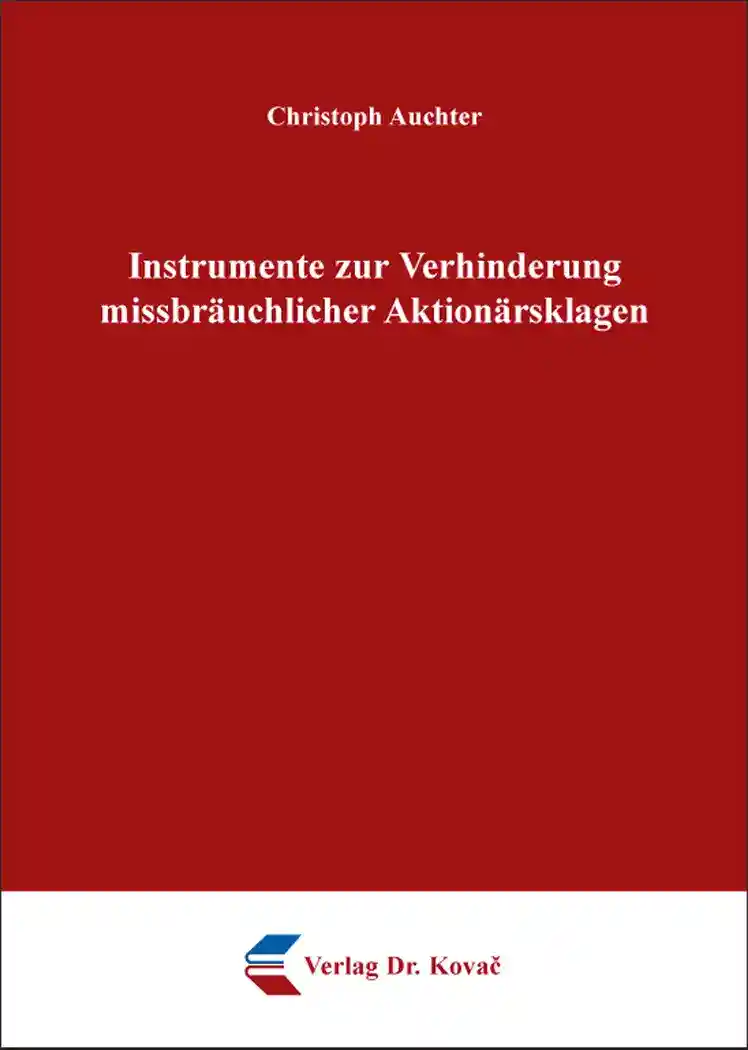Christoph AuchterInstrumente zur Verhinderung missbräuchlicher Aktionärsklagen
Studienreihe wirtschaftsrechtliche Forschungsergebnisse, volume 178
Hamburg 2014, 242 pages
ISBN 978-3-8300-7448-9 (print)
ISBN 978-3-339-07448-5 (eBook)
About this book deutschenglish
The author deals with the problem of “professional plaintiffs” in German company law. Those are shareholders, who file lawsuits against shareholders' resolutions of public companies in order to receive enormous pay-offs for withdrawing them again. Referring to several examples of annual general meeting practice, the author explains this “business”. It is based upon the wide-ranging impacts of recission suits (“Anfechtungs- und Nichtigkeitsklage”) in German company law. Significant AGM resolutions in particular, such as capital increases or enterprise agreements, are blocked – also by unsubstantiated actions – for an incalculable period of time. It is obvious that considerable pressure can be exercised on companies in this way. This can be seen most clearly in the case of acute need for remediation, where the swift implementation of emergency measures is needed. In recent years, these same professional plaintiffs were blamed for the bankruptcy of some major companies in Germany. It is hardly surprising that in the past companies were often prepared to “buy out” of such difficulties by large amounts. When it comes to track or even provoke legal violations – often the smallest form and procedure infringements – in the AGM, professional plaintiffs evince an amazing creativity. Earlier in 2013, an action against a shareholder resolution at the AGM of Siemens was inserted, on the grounds that the sound of the hand dryer in the men's room had drowned the transmission from the assembly hall. To address these annually recurring abusive actions, the legislator has become active. While the measures in the context of the „Gesetz zur Unternehmensintegrität und Modernisierung des Anfechtungsrechts“ (UMAG) 2005 had little effect after general assessment, the „Gesetz zur Umsetzung der Aktionärsrechterichtlinie“ (ARUG) 2009 was expected to bring further improvement. These existing legislative instruments, the so-called “Freigabeverfahren” in particular, are presented and discussed in detail. In a factual study, it is examined how the situation has developed since this last reform. Did the number of recission suits decline? Who were the claimants? The author analyzes the numerous approaches of literature in corporate law. The case law on this subject is brought into focus. On this basis, the author arrives at the conclusion that there is still need for reform. It must be ensured by law that actions can not be based on minor infringements. It is preferable that lawsuits no longer automatically lead to the blockage of resolutions. On the other hand, legal protection of shareholders against unlawful measures is not to be cut. Furthermore, a proposal is made on how the improper motivation of professional plaintiffs could be easier to prove.Keywords
AktienrechtAktienrechtlicher VergleichAktionärsklagenARUGBerufsklägerBeschlussmängelrechtFreigabeverfahrenHauptversammlungMissbräuchliche AnfechtungsklageMissbrauch der AnfechtungsbefugnisProfiklägerRäuberische AktionäreUMAGYour book at Dr. Kovač Publishing House
We publish your doctoral thesis >>
